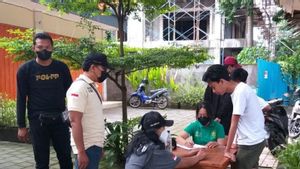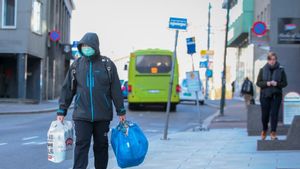JAKARTA - The COVID-19 variant of Omicron provides mild symptoms for sufferers. However, this variant still needs to be watched out in the very high transmission rate.
As stated by Professor of the Faculty of Medicine, University of Indonesia, Prof. dr. Tjandra Yoga Aditama, SpP(K). "Because the transmission rate is very high, it can still burden hospitals because the number of cases is high, not because of the severity," Tjandra said in a health webinar quoted by Antara, Sunday, February 13.
This new variant of COVID-19 is still spreading in various parts of the world. Although some of those who experienced it were asymptomatic and mild cases, there were also fatalities. The World Health Organization (WHO) says that within 10 weeks, 90 million cases of the omicron variant have been found.
"More or less the same as all cases in 2020," said Tjandra.
He said reinfection cases are also more common in this variant from the evidence that omicron can penetrate the existing immunity in people who have been sick.
He reminded people who have already received full vaccinations to return to receiving injections of booster doses, aka boosters, so that the efficacy of the vaccines that have fallen will increase.
SEE ALSO:
Previously, the discussion about the omicron variant in Indonesia was enlivened by preventing the entry of omicron from abroad, but now the discussion has shifted to local transmission. In various countries, cases of omicron have started to fall after about 1-2 months since the beginning of the number of cases starting to rise. However, there are also countries where the number of Omicron cases is still growing.
"We hope that if the increase is not too high, the case will go down soon," he said.
Judging from the Omicron case at the Friendship Hospital, the most visible symptoms were dry cough (63 percent), sore throat (54 percent), runny nose (27 percent), headache (36 percent), fatigue, and muscle aches (60 percent), pain stomach (5 percent) and fever (18 percent).
"In the past, people came to the hospital with chills, now the complaints are more in the upper respiratory tract," he said, adding that in the past the more dominant symptom was fever.
He reminded the public to continue to apply health protocols, immediately check themselves when they have symptoms or are in close contact with infected people. If tested positive, immediately notify the people who have been in close contact. The government is also expected to improve and simplify tests, and promote traceability.
Vaccination is also important in dealing with COVID-19. The public is expected to be given the available vaccines, while the government is expected to facilitate vaccination and increase vaccination for the elderly.
The English, Chinese, Japanese, Arabic, and French versions are automatically generated by the AI. So there may still be inaccuracies in translating, please always see Indonesian as our main language. (system supported by DigitalSiber.id)
















